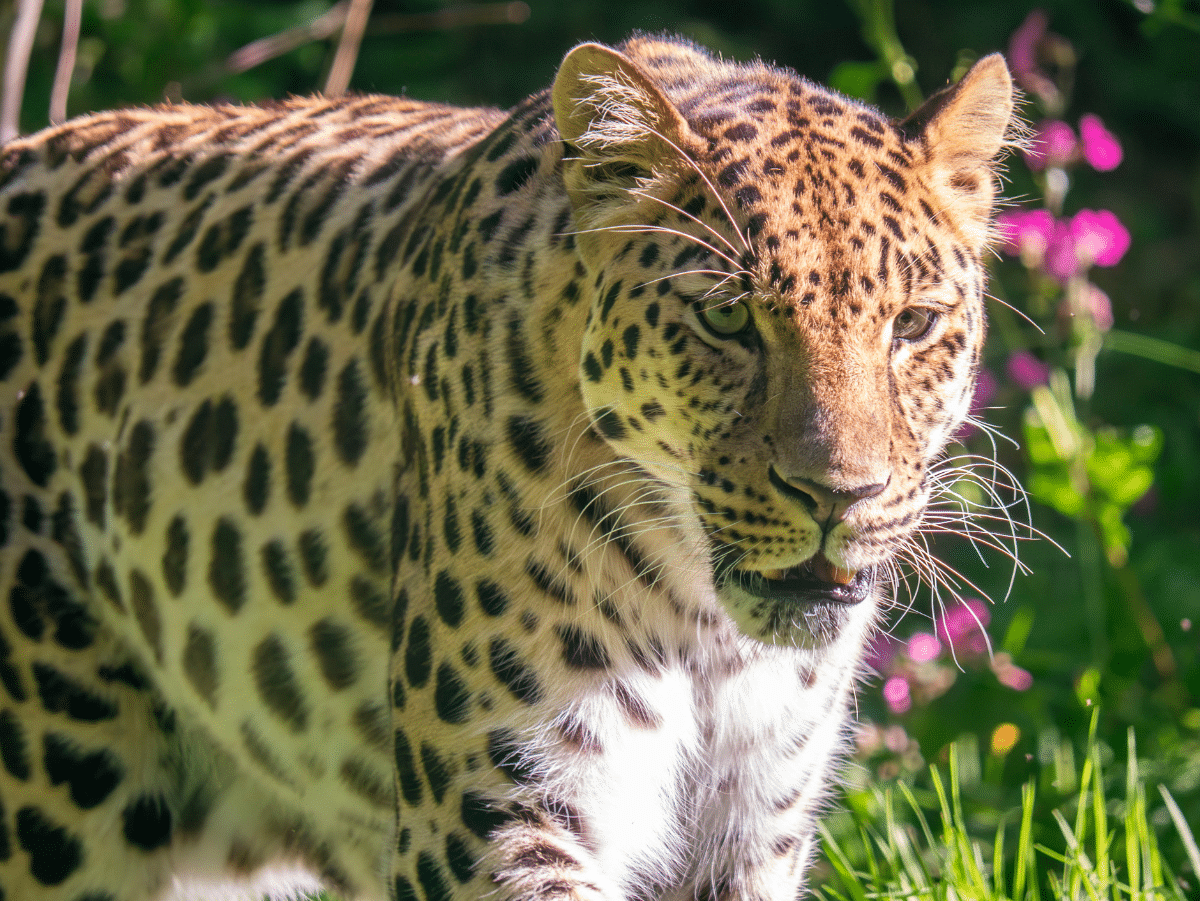Every year on the third Friday of May, people around the world come together to recognise Endangered Species Day, a day to dedicate to raising awareness about the thousands of animals on the brink of extinction. This important day has encouraged individuals, communities and organisations to learn more about endangered animals and the environmental challenges they face.
As of December 2023, 26,060 species have been classified as either Endangered or Critically Endangered, with 9,760 in the most severe category. This day serves as a vital reminder of the planets biodiversity crisis and invites us all to take part in protecting the natural world.
How are animals classified?
The IUCN Red List of Threatened Species is the world’s most comprehensive system for assessing the risk of extinction faced by animals, plants, and fungi. It was created in 1964 by the International Union for Conservation of Nature and is used by zoos and charities like ourselves, governments agencies, and scientists around the world. This list is a vital tool for understanding how healthy (or at risk) our planet’s wildlife really is.
Each species is carefully assessed and placed into one of nine categories, ranging from “Not Evaluated” to “Extinct.” These categories reflect how likely a species is to disappear in the wild. The classification is based on several scientific criteria, such as how quickly the population is declining, how widespread the species is, and the threats it faces in the wild. Species listed as Critically Endangered, Endangered, or Vulnerable are grouped together as “threatened” and are a high priority for conservation. Zoos like ours often play an important role in protecting these species, through breeding programmes and reintroductions to the wild.
Animals at Dartmoor Zoo
Here at Dartmoor Zoo, we are home to a number of animals that are sadly classified as Critically Endangered, Endangered, or Vulnerable. In this blog, we’d like to help raise awareness by highlighting six of these incredible species and the challenges they face.
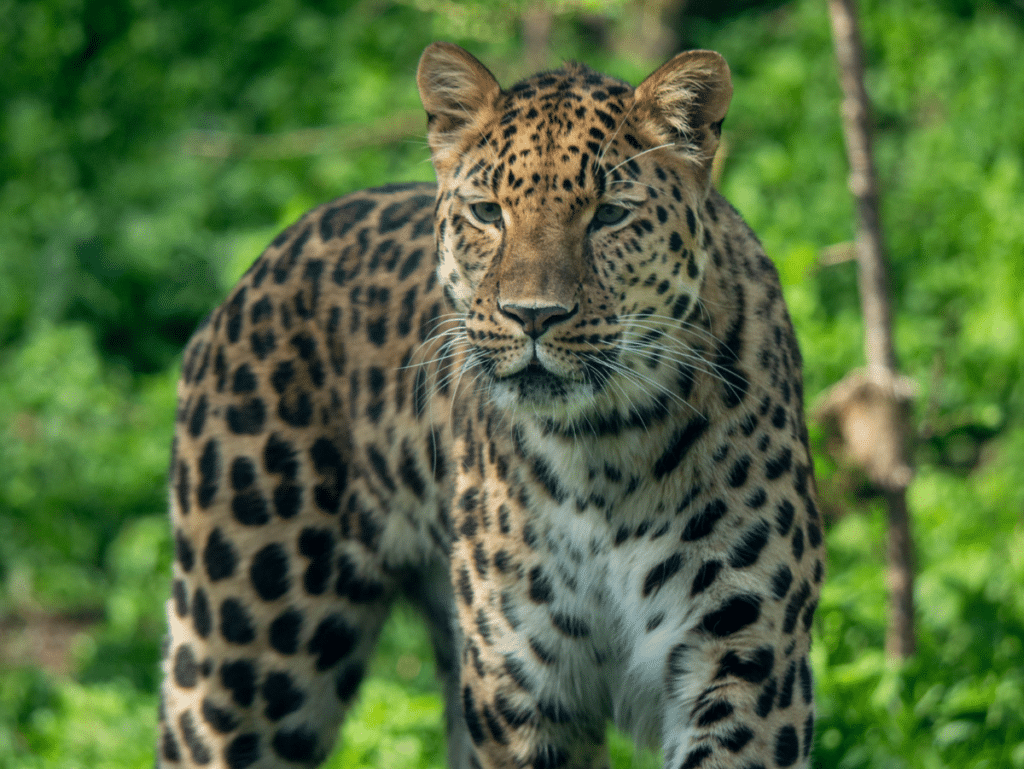
Amur Leopard (Panthera pardus orientalis)
Amur leopards are the rarest big cats in the world, with fewer than 100 left in the wild, they are unfortunately classified on the IUCN Red List as Critically Endangered. Their survival is threatened by poaching, habitat loss, fragmentation, and the illegal wildlife trade. As an apex predator, they play an important role in maintaining a healthy balance of species in their habitat, which influences the condition of their habitat’s ecosystem.
At Dartmoor Zoo, we are proud to care for two Amur leopards, Freddo and Lena, who are part of the European Endangered Species Programme (EEP), a vital breeding effort aimed at safeguarding their future. Freddo arrived with us in November 2023, followed by Lena in August 2024. On April 29th 2025, we successfully introduced them together. We’re excited about the role they will play in helping secure the long-term survival of their species.
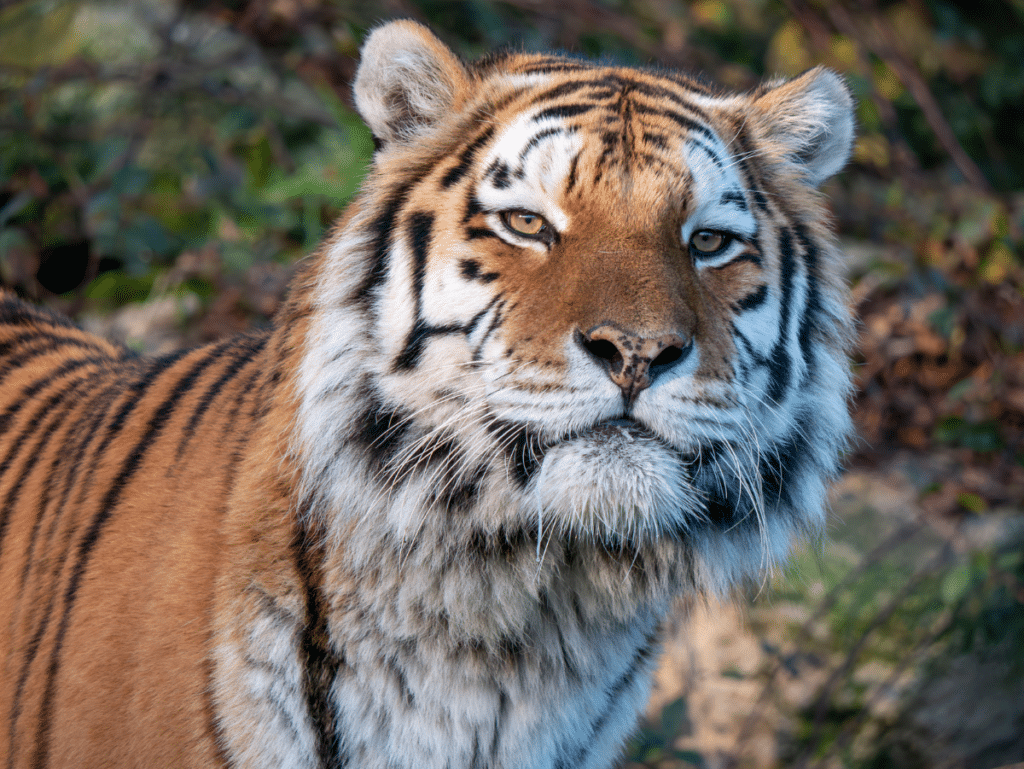
Amur Tiger (Panthera tigris altaica)
Amur tigers, also known as Siberian tigers, are the largest big cat in the world, with the biggest on record weighing around 383kg. Native to the mountainous regions of the Russian Far East and parts of northern China, they share their habitat with the Amur Leopard. Both species face many of the same threats, including poaching, habitat loss from logging and forest fires, and human tiger conflict. As their natural range continues to shrink, Amur tigers and Amur leopards are more likely to come into conflict with each other. They would compete for limited territory and prey in increasingly fragmented landscape.
In the 1940s, Amur tigers came dangerously close to extinction, with their wild population dropping to as few as 30 individuals. Numbers did decline again in the 1990s, but have since stabilised around 400 to 600, thanks to the efforts of scientific, non-governmental and government organisations. Although this progress is good, Amur tigers are classified as Endangered and continued conservation work remains essential for this species.
Here at Dartmoor Zoo, we are home to Dragan, our 10-year-old Amur tiger. Dragan plays a vital role as an ambassador for his species, helping us raise awareness about the threats and the urgent need for conservation.
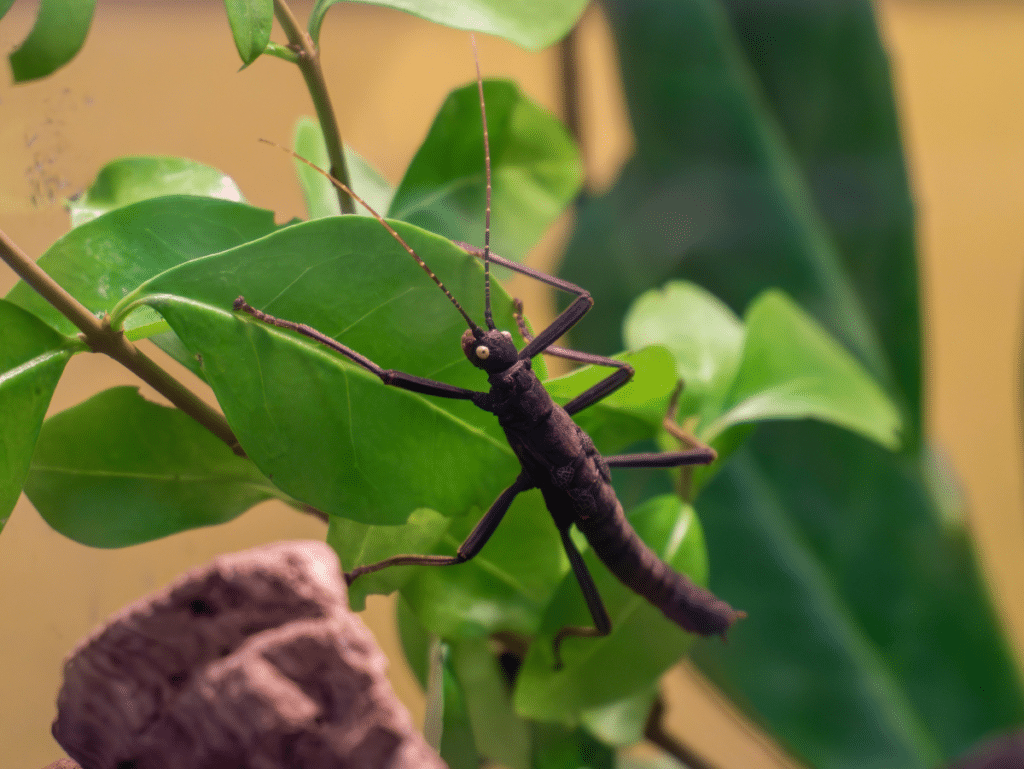
Black Beauty Stick Insect (Peruphasma schultei)
Black beauty stick insects, also known as the golden-eyed stick insect due to their eye colour, are a rare species native to the Cordillera del Condor region of northern Peru, in an area of forest that is less than five square kilometres. They were first discovered in 2005 by German wildlife rescue and management specialist Rainer Schulte. When threatened, they use impressive defence strategies. They flash their bright red wings to startle predators and can also spray a foul-smelling chemical, which may irritate the skin and eyes of potential threats.
Their survival is threatened by habitat loss due to deforestation, the spread of invasive species, and the pet trade. Although classified as Critically Endangered in the wild, they are now commonly bred in captivity. While this has helped grow their numbers in human care, it raises concerns about the long-term impact on wild populations and the ethics of trading endangered species. Protecting and raising awareness of their native habitat remains vital to ensuring their survival in the wild.
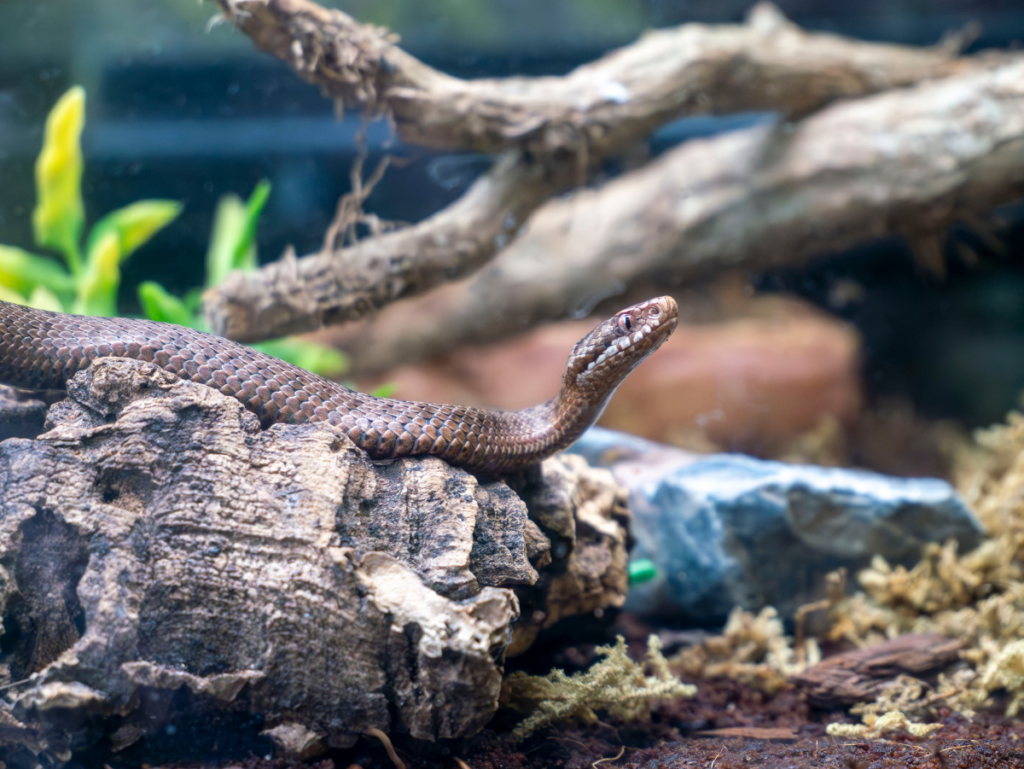
European Adder (Vipera berus)
The European adder is one of three native snake species to the UK, and as a viper, they are the only venomous UK snake. However, do not be afraid of them as adders are not aggressive and only strike in self-defence. Furthermore, we have readily available anti-venom for same day delivery UK wide, and our last recorded death by adder bite was 50 years ago.
In Europe, the European adder is listed as Least Concern on the IUCN Red List, however, here in the UK the adder is considered Endangered. Populations are rapidly declining due to habitat loss, fragmentation, climate change and human disturbance. It has unfortunately been predicted that adders in the UK could become extinct by 2032, despite being protected by the 1981 Wildlife and Countryside Act.
At Dartmoor Zoo, we are proud to care for two young adders who were born in August 2023. We hope by giving people a chance to see and learn about these misunderstood reptiles, it will raise awareness and inspire action to protect an Endangered UK native species.
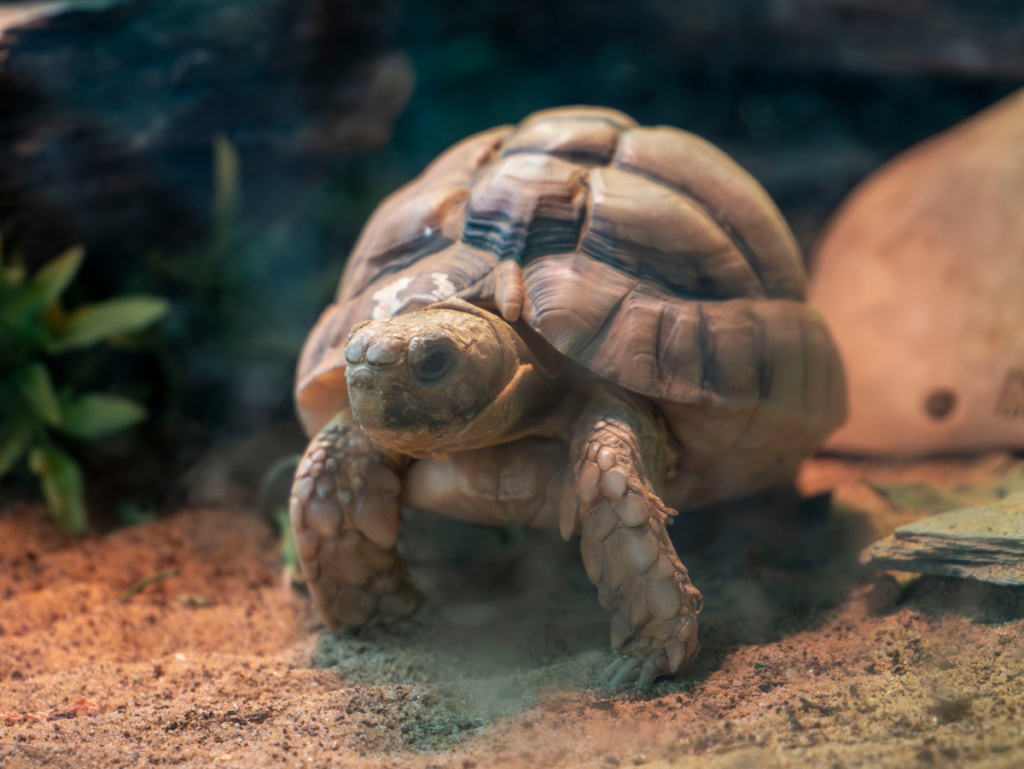
Egyptian Tortoise (Testudo kleinmanni)
Egyptian tortoises are the smallest species of tortoise found in the Northern Hemisphere, with the average weight of an adult being between156g – 354g. To put their size into perspective, it would take around 400 Egyptian tortoises to equal the weight of just one Galapagos tortoise.
Native to the arid coastal deserts of Egypt, Libya, and parts of Israel, they are perfectly adapted to harsh desert environments. However, they are now Critically Endangered, with an estimated wild population of just 7,470, which is still decreasing to this day. They face threats such as habitat loss due to agricultural expansion, overgrazing, and the illegal pet trade.
At Dartmoor Zoo, we have our resident Egyptian Tortoise, King Tut, who turns 12 years old in June. Despite his small size, King Tut plays an important role in raising awareness of the challenges and the importance of protecting their habitat.
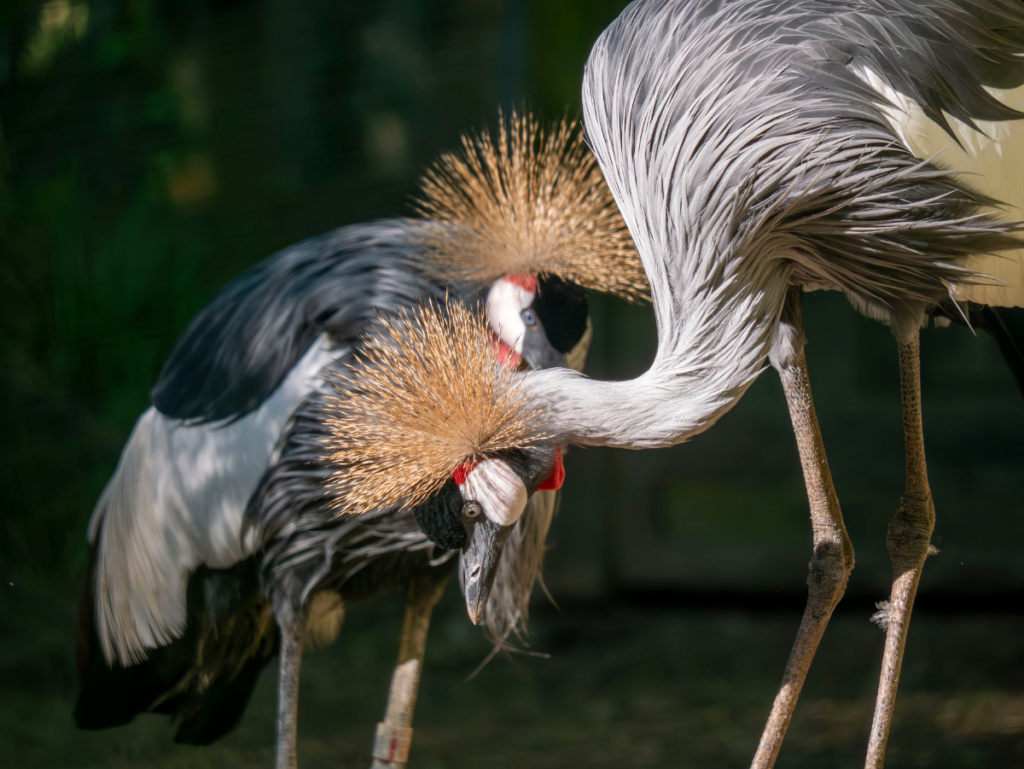
East African Grey Crowned Crane (Balearica regulorum)
The stars of the African aviary, our two stunning East African grey crowned cranes are a pair called Derek and Zuri. These Endangered birds are considered so iconic – likely for their amazing crown – in their region that they became the national bird of Uganda! Furthermore, local superstitions claim the cranes are symbols of wealth, good fortune, and longevity. Despite this recognition, grey crowned cranes face many threats such as habitat loss due to agriculture, being captured to become status symbol pets, and poisoning by pesticides.
The agriculture causing the most habitat loss is rice farming, and since locals see no benefit from the cranes, they are reluctant to conserve land. Future plans will hopefully improve wetlands to support both farmers livelihoods and conservation. Another huge threat to this species is poisoning. Even though the cranes are not consuming the rice, they are in fact pests to maize farms, leading to some farmers to poison them. Luckily, a lot of the locals respect the cranes and will opt for other methods such as having someone to stand guard. Conservationists work with these farmers to encourage scarecrows and alternative protection strategies to reduce crane casualties.
Due to these threats, their global population has fallen by 75% in the past 40 years. Although their numbers are estimated at 58,000 to 77,000 individuals globally, the rapid decline is a cause for concern and gives them the Endangered status to hopefully protect them from further loss.
Our Impact
Dartmoor Zoo is committed to supporting both global and local conservation efforts.
In 2024, we donated a portion of our ticket sales to Wildcats Conservation Alliance (WCA) – a vital initiative led by Zoological Society of London (ZSL) and the Dreamworld Wildlife Foundation. This project calls for zoos and public alike to support wild tigers and Amur leopards. The WCA helps to protect these animals on the front line through anti-poaching patrols, population and health monitoring, conflict mitigation, and community education. Our participation in the European Endangered Species Programme (EEP), with hopes for a successful breeding from our Amur Leopards, Freddo and Lena, will also directly support global conservation goals for this species.
Closer to home, we are so passionate about raising awareness of many threatened species in our care. Our team delivers daily animal talks to help educate and inspire our visitors of all ages. They highlight the challenges facing wildlife across the world and encourage positive action, such as being mindful of where our food and everyday products come from.
We also run a wide range of educational workshops and programmes for the younger generation, including Rangers Academy, Conservation Careers, Home Education Days and more. These experiences connect people with nature in an active and engaging way, and we hope to inspire the next generation to care deeply about our planet and the animals we share it with.
What can you do to help?
There are many ways you can help support endangered species on this special day. An easy one to do from home is simply building up your knowledge on the subject, reading this blog is a good start. With around 26,000 species classified as endangered, your favourite animal could be on the IUCN Red List.
Another great way to help endangered species is to support Dartmoor Zoo. We offer lots of ways to get involved including adoptions for endangered animals such as our Amur leopards, tiger, and our tortoises. We also offer bespoke adoptions so you can choose another one of our special endangered animals such as the golden Mantella frog, grey crowned crane, our adders, or even the Lau banded iguana. Alternatively, you could send donations towards feeding our animals or book an experience to meet our Amur tiger! All your kind donations help us continue the vital conservation and breeding projects for our endangered species.
Additionally, challenging negative stigma around traditionally “scary” animals such as our stick insects can help remove unnecessary barriers holding back their conservation. All animals are important to keep ecosystems balanced!
Finally, staying mindful of your consumerism is a big help. Unfortunately, a lot of products such as meats contribute to the main issue that endangered species face: habitat loss. For example, a lot of land is cleared for cattle ranching or goat and sheep farms. Similarly, you should never buy exotic animal products such as leopard or tiger skins as this creates a demand for poachers to hunt and kill these endangered species for profit.
Hopefully these ideas will get you thinking about how you can support your favourite endangered species and celebrate Endangered Species Day!
Sources:
https://www.iucnredlist.org/ | https://conservewildcats.org/ | https://www.tortoisetrust.org/guests/tortoisecare/species.html | Dartmoor Zoo Animal Pack | https://scotlandsthemepark.com/attractions/amazonia/animals/invertebrates/black-beauty-stick-insect/ | https://www.bristolzoo.org.uk/news/arrival-of-endangered-east-african-grey-crowned-crane | https://www.dartmoorzoo.org.uk/education/ | https://www.arc-trust.org/adder
